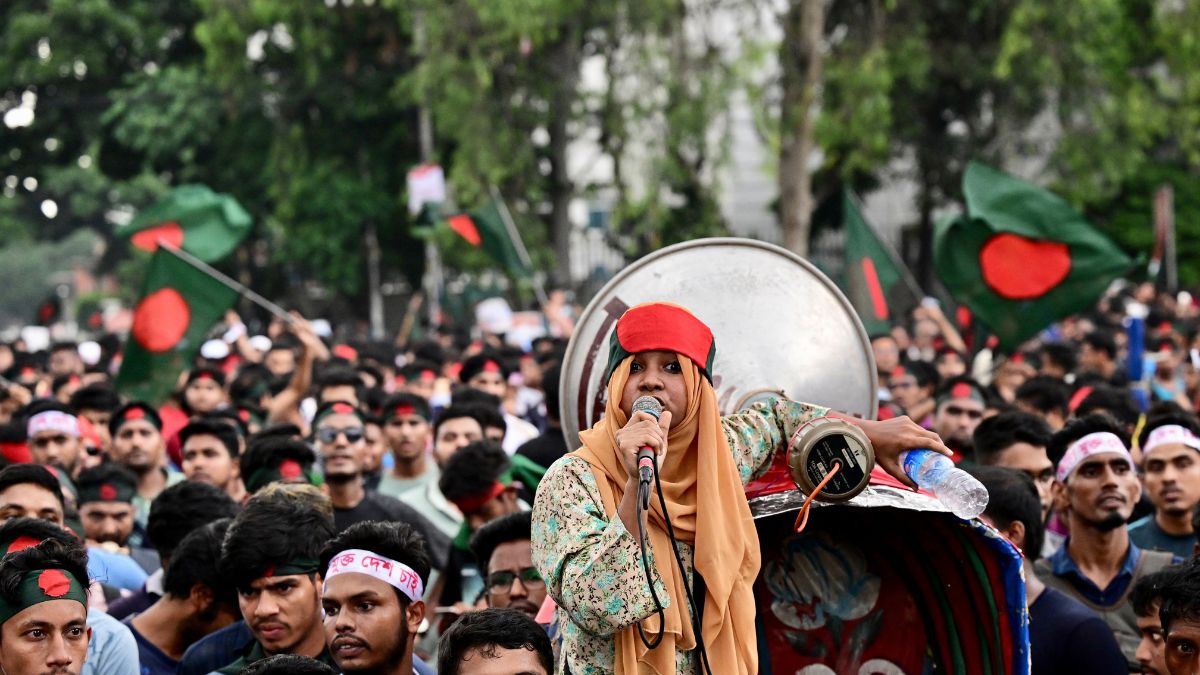Deadly protests have gripped Bangladesh as students take to the streets to demonstrate against job quotas in the public sector. Over 30 people are believed to have died as violent clashes between protesters and police continue.
A slogan by protesters has flooded the streets of Dhaka, triggering a war of words between the Sheikh Hasina-led government and students. “Tui ke? Ami ke? Razakar, Razakar! Ke boleche, ke boleche, sairachar- sairachar.” As India Today mentioned, the slogan translates to “Who are you? Who am I? Razakar, Razakar! Who says that who says that, dictator, dictator!”
The chants have hit a raw nerve in Bangladesh where Razakar is a highly offensive term. Students terming Hasina a “dictator” has also shocked many.
Who were the Razakars? Why is the spectre of Razakars being raised now in Bangladesh? We explain.
Razakars and the Bangladesh Liberation War
The Razakars were a paramilitary force that collaborated with the Pakistan army during the 1971 Bangladesh Liberation War.
Razakar, which means ‘volunteer’ or ‘helper’ in Persian and Urdu, consisted mainly of pro-Pakistani Bengalis and Biharis in Bangladesh (then known as East Pakistan) who were against the separation of East and West Pakistan.
An estimated 50,000 Razakars helped the Pakistan army in conducting raids and committing atrocities against the local population, as per an Indian Express report.
According to anthropologist Nayanika Mookherjee, the term ‘Razakars’ is used as an abuse in Bangladesh. It has come to mean ‘collaborator’ and is linked with betrayal in the country, the newspaper report added.
Impact Shorts
More ShortsThe Razakars, along with radical religious militias like Al-Badr and Al-Shams, targeted civilians, students, intellectuals and religious minorities, who opposed Pakistan’s occupation, reported India Today.
The brutal action against pro-Liberation Bangladeshis by the Pakistani military with the aid of Razakars led to the death of anywhere between 300,000 to 3 million (30 lakh) civilians, rape of 100,000 to 400,000 women and 25,000 to 195,000 forced pregnancies, according to Indian Express.
ALSO READ: What’s behind Bangladesh’s violent student protests that have led to shut down of universities?
Why Razakars are back in Bangladesh’s rhetoric
In July, university campuses across Bangladesh erupted in protests against the 30 per cent quota for descendants of freedom fighters of the 1971 Bangladeshi Liberation War. The demonstrations are a result of a High Court order that upheld the quota system for government jobs.
A reference to Razakars by Prime Minister Hasina further sparked outrage among protesting students.
Addressing a press conference last weekend, Hasina said, “Are the children and grandchildren of freedom fighters not talented? Are only the children and grandchildren of Razakars talented? Why do they have so much resentment towards freedom fighters? If the grandchildren of the freedom fighters don’t get quota benefits, should the grandchildren of Razakars get the benefit?”
After the PM, her party leaders also fueled resentment among protesters by making similar remarks. “Razakars have no right to hold the blood-stained red and green flag of the Liberation War martyrs”, social welfare minister Dipu Moni reportedly said.
Hasina’s remarks, perceived as “dismissive and insulting”, triggered protests, noted Scroll.
Many students were offended by them being likened to Razakars, who are seen as a symbol of betrayal and treachery in the nation. To express their protest, the protesters started sarcastically referring to themselves as “Razakars”.
This infuriated PM Hasina, who reportedly said, “They did not witness the bodies lying in the streets, yet they feel no shame in calling themselves Razakars.”
Education minister Mohibul Hassan Chowdhury wrote on Facebook, “Those who proclaim ‘I am a Razakar’ have demonstrated themselves to be the ‘true’ Razakars of this era. They disregard both the court and the government.”
Speaking to Scroll, Sarjis Islam, one of the leaders of protesting students, alleged the government wants to quell the protests with a “wrong interpretation” of the slogan.
“We vented our frustration and anger that we were called Razakars because we sought equal rights for all. It seems they want to quash the protest with wrong interpretation.”
However, some believe the government has not misunderstood the intention behind students calling themselves Razakars. “They are completely aware of what the students meant by those slogans. But they are conveniently portraying them to make it work in their favour,” political analyst and commentator Zahed Ur Rahman told Scroll.
Why Hasina being called ‘dictator’ is notable
Hasina has been accused of ruling Bangladesh with an iron fist. She came to power earlier this year for a fourth straight term amid allegations of electoral rigging.
The term ‘dictator’, which has been used by her political opponents, is being openly used by the general public for the first time in her more than a decade-and-a-half rule, as per Scroll.
Mubashar Hasan, a Bangladesh expert and post-doctoral researcher at the University of Oslo, Norway, told India Today, that labelling her a ‘dictator’ signals doubts about the general elections.
“Hasina’s government was thriving in disseminating fear in society. Now, it seems that fear has gone away, and as a result, it is plausible to argue that there is growing and explicit criticism of Hasina’s leadership and, by publicly calling her dictator through slogans, it is evident that students are questioning her election engineering too,” Hasan said.
With inputs from agencies
)